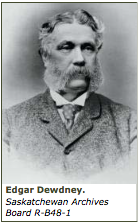
Edgar Dewdney was born in Bideford, Devonshire, England on November 5, 1835, to a prosperous family. Arriving in Victoria in the Crown Colony of Vancouver Island in May 1859 during a Gold rush, he spent more than a decade surveying and building trails through the mountains on the mainland. In 1872, shortly after British Columbia’s entry into Confederation, he was elected MP for Yale and became a loyal devotee of John A. Macdonald and the Conservative Party. In Parliament he pursued the narrow agenda of getting the transcontinental railway built with the terminal route via the Fraser Valley, where he happened to have real estate interests.
In 1879 Dewdney became Indian commissioner of the North-West Territories (NWT) with the immediate task of averting mass starvation and unrest among the First Nations following the sudden disappearance of the buffalo. Backed by a small contingent of Indian agents and Mounted Police, he used the distribution of rations as a device to impose state authority on the First Nations population. Facing hunger and destitution, First Nations people were compelled to settle on reserves, adopt agriculture and send their children to mission schools. These measures to bring about self-sufficiency and cultural assimilation appeared to be working, but provoked a sullen resentment that could not be repressed in the spring of 1885. Dewdney has often been blamed for the North-West Resistance, but in truth much of the responsibility lay in policies devised in Ottawa by men unfamiliar with western conditions. He had warned his superiors of the dangers and urged them to resolve First Nations and Métis grievances, but to little avail. He did succeed, however, in limiting Indian involvement in the hostilities by acts of unprecedented generosity with food and presents. Following the Resistance, a policy of strict surveillance and coercive tutelage was imposed, and it endured as his legacy to First Nations administration in the region.
In 1881 Dewdney was appointed Lieutenant-Governor of the NWT, a position he held in conjunction with that of Indian commissioner. One of his first significant acts in this role was the selection of Regina as the new territorial capital in 1882. He happened to own land in the vicinity and was widely criticized by Liberal politicians and the press for his attempt to profit from the decision. As Lieutenant-Governor, he exercised real executive power and his authority was independent of the North-West Council, a partly elected, partly appointed body that served as an incipient popular assembly for the region. As the settler population grew, the elected Council members became increasingly insistent on a larger role in decision-making. They demanded a responsible executive, representation in Parliament and ultimately provincial status. The Lieutenant-Governor’s policy, in accordance with Prime Minister Macdonald’s wishes, was to keep these demands in check while gradually conceding democratic reforms.
In 1888 Dewdney resigned his two positions in Regina and entered Macdonald’s federal Cabinet as Minister of the Interior. His connection with the prairie region remained, in that he was now MP for Assiniboia East and his portfolio included the administration of the NWT. In connection with this, his policy was as before: the gradual devolution of political powers to the Territorial Assembly (which had replaced the North-West Council in 1888) while resisting the creation of a responsible executive.
Dewdney left Parliament and his Cabinet post in October 1892 to become Lieutenant-Governor of British Columbia, something he had long coveted. His new position was mainly social and ceremonial in nature, and he enjoyed it immensely. Upon completion of his term of office in 1897, he stayed on in Victoria in semi-retirement, pursuing his passion for investments in real estate, mining and railways. He died on August 8, 1916. He was married twice and there were no children from either relationship.
Edgar Dewdney was a representative of a class of immigrant adventurers who saw in the western Canadian frontier an opportunity for self-aggrandizement. He viewed public office as a means to personal wealth and acquired a reputation as a speculative fortune hunter. Yet his dream of sufficient wealth to lead a life of gentlemanly leisure continued to elude him. He was also noted for his intense loyalty to the Conservative Party—a man who readily used his public offices to dispense an enormous array of patronage appointments and government contracts to the party faithful. One of the main thoroughfares in Regina is named in his honour.
Brian Titley

